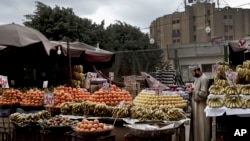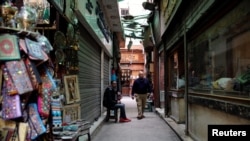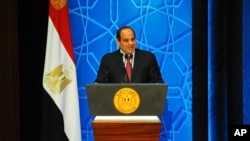Egyptians are bearing down under their worst inflation in a decade, cutting spending as much as possible as prices surge on basic food items, transportation, housing, and even some essential medicines.
Inflation reached almost 30 percent in January, up 5 percent over the previous month, driven by the floatation of the Egyptian pound and slashing of fuel subsidies enacted by President Abdel-Fattah el-Sissi in November.
The move was part of a reform package to secure an IMF bailout loan of $12 billion desperately needed to shore up investor confidence and overhaul the economy. Immediately after the floatation, the pound lost over half its value, making a wide range of Egypt’s many imported goods double in price.
Quietly tightening belts
In the months since, Egyptians have been left with a grim search for ways to tighten their belts and make ends meet, hoping eventually the promised benefits of reform like growth and job creation come.
There’s little public outlet to voice discontent, with opposition and dissent in general crushed, and alternatives to el-Sissi’s rule unfathomable for most. Many fear saying anything negative about the country in public.
“People are buying half of what they did before, because it’s gotten very expensive,” said Hassan, a butcher who only gave his first name for fear of creating too much attention.
Food and drinks have seen some of the largest increases, costing nearly 40 percent more since the floatation, figures from the statistics agency show. Some meat prices have leaped nearly 50 percent.
“They’re buying less than before. Instead of buying five or six items they’ll buy two, for example,” said a grocery clerk, Ismael, who gave only his first name for similar reasons. “No one knows what the prices will be next. But hopefully tomorrow things will get better.”
Little alternative to reforms
The economy has yet to recover from the 2011 Arab Spring uprising that overthrew longtime autocrat Hosni Mubarak. Investment and tourism, a pillar of the economy, were both gutted by political turmoil and terror attacks.
Keeping the pound’s value high artificially was draining foreign reserves at a time of waning largess from Saudi Arabia and Gulf Arab allies, who propped up el-Sissi’s Egypt with tens of billions of dollars after he led the military’s ouster of his Islamist predecessor, Mohammed Morsi, in 2013. Paying for subsidies also sucked up much of the budget.
Reforms were long avoided by Egypt’s leaders for fear of a popular backlash like the 1977 bread riots that forced the reversal of food subsidy cuts.
There have been some positive signs since the shock reforms were enacted. Investors have flocked to buy Egyptian bonds, and foreign reserves are rising. The pound has regained some strength, trading around 16 per dollar as opposed to nearly 20 in late December. People have changed buying habits, purchasing local goods, instead of imports, rendered more expensive by both the exchange rate and newly imposed high import tariffs.
Economists, the government and the IMF predict inflation will ease later this year.
In the meantime, people are using public transport more, moving children to less expensive private schools, avoiding meat, using electricity more thriftily and supplementing some purchases with food handouts from the army.
Poor hit hardest
But among the poor, daily needs are being hit hard. Nearly a third of Egypt’s population of 92 million people lives under the U.N. poverty line of $1.9 a day.
“For people who are more working class or poor, there’s less room for belt-tightening at this point since such a large percentage of their salary was already devoted toward purchasing food,” said Timothy Kaldas, a non-resident fellow with the Tahrir Institute for Middle East policy.
Some drugs have gotten harder to find in pharmacies. Manufacturers have slowed or stopped production on some medicines because higher prices of components make them less profitable or unprofitable, since prices are fixed by the state. Accusations of drug hoarding abound amid expectations the government will have to bump up the prices.
The government appears to be betting it can keep a lid on any discontent long enough for hoped-for growth to kick in.
President keeps tight grip
In speeches, el-Sissi has commended Egyptians for enduring what he called difficult measures, while telling them further cutbacks are inevitable.
His government, meanwhile, has kept an iron grip. A crackdown over the past two years has crushed both the Islamist movement and secular pro-democracy activists, with thousands arrested, leaving almost no organized opposition. Unauthorized gatherings are banned.
Pro-el-Sissi media consistently demonize dissidents and discourage any complaining, urging a patriotic front.
Calls for protests following the initial price hikes in November fizzled and, for the moment, there appears to be little attempt at more.
Kaldas said that in the view of the population, they had two uprisings that ousted two governments and quality of life has only deteriorated.
“The likelihood that they would see that as a solution going forward anytime soon is, I think, pretty slim,” he said.






